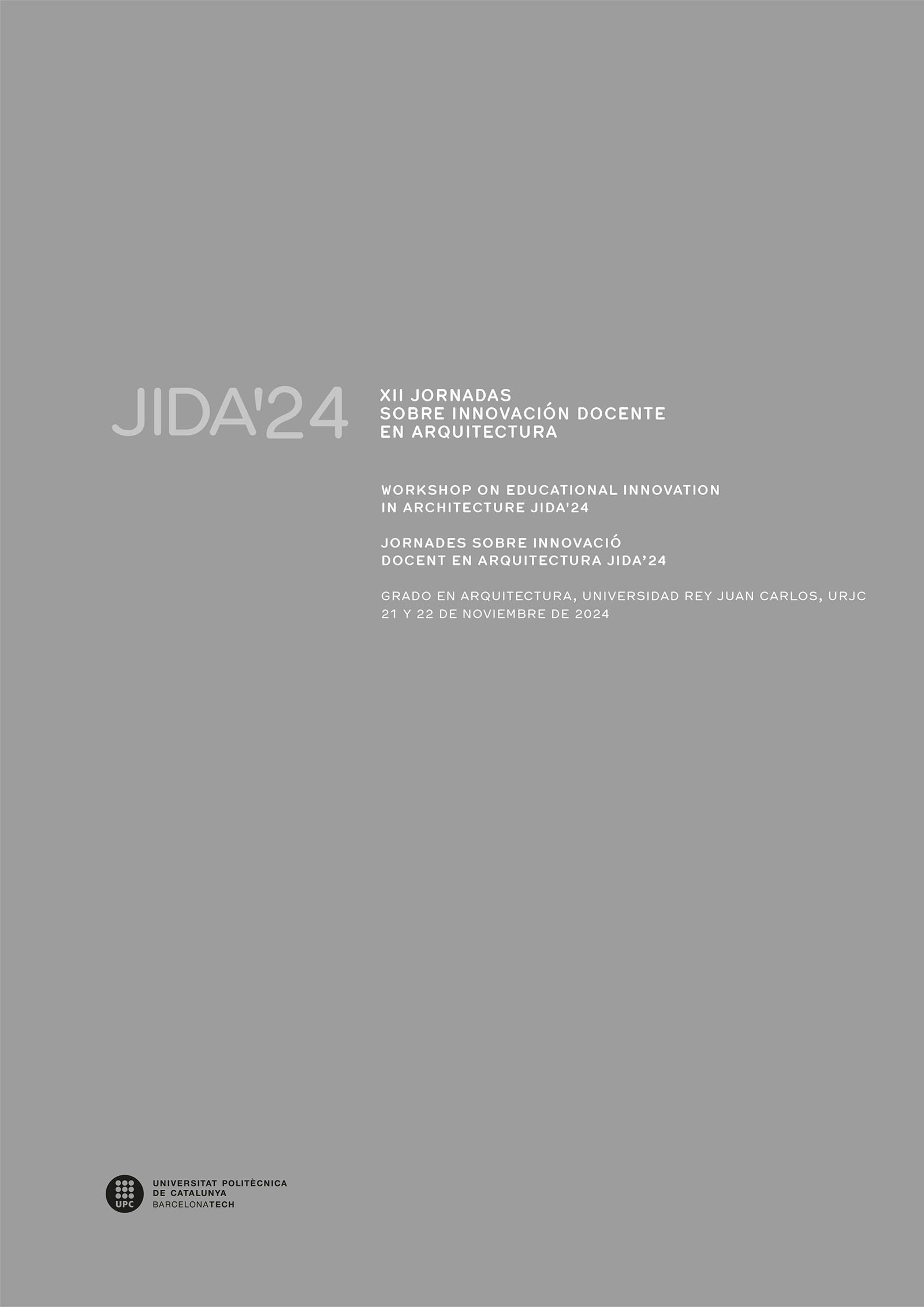Interdisciplinary workshops on educational space design with analog and digital techniques
DOI:
https://doi.org/10.5821/jida.2024.13263Keywords:
project-based learning, interdisciplinarity, educational space, artificial intelligence, modelsAbstract
The described experience is part of the educational innovation project "New Scenarios for Learning and Educational Innovation," which emphasizes the need to integrate interdisciplinary work in early university education. The aim of this project is to create a learning environment for the design of educational spaces, collaboratively addressing both pedagogical and architectural design, with a special focus on the technological framework needed in today's digital society. Two interdisciplinary workshops, conducted with second-year students from the dual degree in Early Childhood and Primary Education and third-year Architecture students, form the key activities of this project. This communication analyzes how the use of analog and digital tools in both workshops helps establish a common language among students from different disciplines and enhances the integration of technical aspects in the project in the case of architecture students.
References
Barrett, Peter, Yufan Zhang, Fay Davies, y Lucinda Barrett. 2015. Clever classrooms : Summary report of the HEAD project. Manchester: University of Salford.
Galera-Rodríguez, Andrés, Elena González-Gracia, y Gracia Cabezas-García. 2022. «¿Cuánto mide? Una experiencia reflexiva previa como inicio de los estudios de Arquitectura». En X Jornadas sobre Innovación Docente en Arquitectura (JIDA’22), Escuela Técnica Superior de Arquitectura de Reus, 17 y 18 de Noviembre de 2022: libro de actas, 474-87. Barcelona: Universitat Politècnica de Catalunya. Iniciativa Digital Politècnica. https://doi.org/10.5821/jida.2022.11612.
Genís Vinyals, Mariona. 2018. «El papel de la formación técnica: ¿una oportunidad perdida?» En JIDA 5: textos de Arquitectura, docencia e investigación, 44-47. Iniciativa Digital Politècnica.
Genís-Vinyals, Mariona, Albert Casals Balagué, y José Luís González Moreno-Navarro. 2012. «Learning architectural restoration trough cooperative working strategies». En ACSA International 2012 conference. Change, Architecture, Education, Practice, editado por Xavier Costa y Marta Thorne. https://doi.org/ISBN 978-0-935502-83-1.
Jutraz, Anja, y Andreja Kukec. 2016. «New methods in teachinb architectura and medicine students while designing quality living environment» 7513-21. https://doi.org/10.21125/edulearn.2016.0640.
Koehler, Matthew J., y Punya Mishra. 2009. «What is Technological Pedagogical Content Knowledge (TPACK)?» Contemporary Issues in Technology and Teacher Education, 60-70.
Nair, Prakash, y Parul Minhas. 2023. A NEW Language of School Design. Evidence- Based Strategies fos Students Achievement & Well-being. Editado por and education design international Association for learning environments. New York: Association for learning environments, and education design international.
OECD. 2023. «OECD Future of Education and Skills 2030- OECD Learning Compass 20230. A series of concept notes.» https://www.oecd.org/en/about/projects/future-of-education-and-skills-2030.html.
Pérez Sánchez, Joaquín, Jaume Farreny Morancho, Gemma Ferré Pueyo, y Josep Maria Toldrà Domingo. 2022. «Las extensiones del cuerpo». En X Jornadas sobre Innovación Docente en Arquitectura (JIDA’22), Escuela Técnica Superior de Arquitectura de Reus, 17 y 18 de Noviembre de 2022: libro de actas, 436-49. Barcelona: Universitat Politècnica de Catalunya. Iniciativa Digital Politècnica. https://doi.org/10.5821/jida.2022.11600.
Piaget, Jean. 1972. «The epistemology of interdisciplinary relationships». Interdisciplinarity: Problems of teaching and research in universitie, 127-39.
Portalés Mañanós, Ana, Asenet Sosa Espinosa, y Maite Palomares Figueres. 2019. «Dinámicas participativas y multidisciplinariedad en proyectos docentes de regeneración urbana». En VII Jornadas sobre Innovación Docente en Arquitectura (JIDA’19), Escuela Técnica Superior de Arquitectura de Madrid, 14 y 15 de Noviembre de 2019: libro de actas, 583-96. Barcelona: Grup per a la Innovació i la Logística Docent en l’Arquitectura (GILDA). https://doi.org/10.5821/jida.2019.8378.
Spector, Jonathan Michael. 2014. «Conceptualizing the emerging field of smart learning environments». Smart Learning Environments 1 (1): 2. https://doi.org/10.1186/s40561-014-0002-7.
Unciti, Oihane, Antoni Martinez Ballesté, y Ramon Palau. 2024. «Real-Time Emotion Recognition and its Effects in a Learning Environment.» Interaction Design and Architecture(s), n.o 60 (marzo), 85-102. https://doi.org/10.55612/s-5002-060-003.
Villazón Godoy, Rafael Enrique. 2009. «Learn from the small: case studies as an alternative method to the architectural projects studio». En 1st International Conference on Education and New Learning Technologies, 2911-21. Barcelona.






















